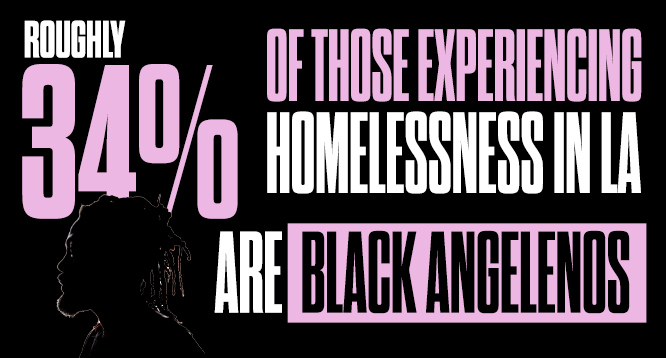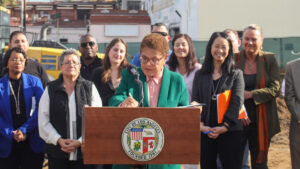The Challenge
The homelessness crisis in Los Angeles is a systemic problem. Persistent homelessness is a legacy of racist and exclusionary land use policy, and fueled by broken criminal justice, employment, and healthcare systems and pernicious stigmas towards mental health, substance abuse, and race. Indeed, Black, Native, and LGBTQIA+ individuals disproportionately experience homelessness, especially among youth populations. Efforts to assist people experiencing homelessness into housing are hampered by a lack of robust coordination among the many agencies and organizations involved in providing the services needed.
Homelessness in Los Angeles places both an inhumane burden on unhoused individuals and represents a shared trauma for our city. Over the years, the LA County homeless population has steadily grown to an estimated 66,000 people. The rising number of unhoused individuals and families visible on so many streets in Los Angeles can give the impression that nothing is being done. On the contrary, rehousing through measures like Project Roomkey has increased in the past year, and yet, the population of newly homeless is sadly outpacing these efforts. This shows that we can increase re-housing efforts, as we have, but without comprehensively addressing the systemic issues causing homelessness we are still losing ground with devastating consequences for the unhoused and our entire community.
As detailed in last Fall’s “No Going Back LA” report, COVID-19 has brought the stakes of fair housing for all Angelenos into even sharper relief. Even before the pandemic, the mortality rate for the unhoused population was three times higher than the County population. During the COVID-19 crisis, unhoused people were also faced with an impossible decision: stay outside and often forgo basic sanitary facilities, or find a crowded shelter where social distancing was not always possible. This is an unacceptable and shameful risk to their well-being as well as the community’s collective health. As we have so clearly seen in this last year, the lack of care for any single member affects us all. With ‘create housing for all and end unsheltered homelessness’ as a core principle, The Committee For Greater LA convened the Housing and Homelessness Action Team to develop a Plan for Homelessness Governance in LA in partnership with The Pat Brown Institute for Public Affairs.

- Native Americans share of homeless population is roughly 5x their share of LA County
- Up to 40% of LA homeless youth identify as LGBTQIA+
The Way Forward
The intersectional nature of the crisis requires a dramatic increase in collective action. As our homelessness governance report, “We’re Not Giving Up”, makes clear – meaningful and lasting systems change will only occur through a unified overhaul of regional coordination across municipal, private, and community organizations seeking to end homelessness in Greater Los Angeles. Los Angeles philanthropic organizations have contributed more than $17 million to programs focused on combating the causes of homelessness and developing effective approaches to serving and supporting people experiencing homelessness.
“We definitely need more money and should improve existing institutions, but we most truly need alignment of money and institutions around a common mission with agreed-upon and impactful outcomes. The actual governance problem in Los Angeles is the absence of a center, a magnetic force that can draw our disparate best efforts to a common mission.”
We’re Not Giving Up Report
Thankfully, there are signs that this perspective is beginning to take hold. Earlier this year, authorities and outreach teams worked in tandem to clear the Venice homeless settlements through a municipal program called, “Encampment to Home”.The hard work and cross-sector collaboration between community-based organizations such as the St. Joseph Center, Venice Family Clinic, PATH and municipal authorities like the Department of Beaches and Harbors and LAHSA resulted in no escalations of violence or arrests made. Instead, everyone was offered transitional housing with a majority placed into new accommodations. This is the fruit of bringing together diverse stakeholders and necessary resources under an explicitly coordinated goal. What happened in Venice Beach is a microcosm of what’s needed on a massive scale.
We can end homelessness in Los Angeles but not through siloed bureaucracies or uncoordinated efforts. We must instead define our shared goals, advocate effectively for those goals, and capitalize on the momentum of legislation such as Measures HHH, H, and the emergency responses to COVID-19 like Project Roomkey to turn short-term solutions into just systems that serve all. With new structures of governance, clear accountability, and a renewed sense of urgency and mission, we can dismantle the structural inequities and racism that we see so often on our streets and finally deliver fair housing for all.
We encourage you to read our homelessness governance report, “We’re Not Giving Up” today!



